
Federico Fellini was an Italian film director and screenwriter. He is known for his distinctive style, which blends fantasy and baroque images with earthiness. He is recognized as one of the greatest and most influential filmmakers of all time. His films have ranked highly in critical polls such as that of Cahiers du Cinéma and Sight & Sound, which lists his 1963 film 8+1⁄2 as the 10th-greatest film.

Amarcord is a 1973 comedy-drama film directed by Federico Fellini, a semi-autobiographical tale about Titta, an adolescent boy growing up among an eccentric cast of characters in the village of Borgo San Giuliano in 1930s Fascist Italy. The film's title is a univerbation of the Romagnol phrase a m'arcôrd. The title then became a neologism of the Italian language, with the meaning of "nostalgic revocation". The central role of Titta is based on Fellini's childhood friend from Rimini, Luigi Titta Benzi. Benzi became a lawyer and remained in close contact with Fellini throughout his life.
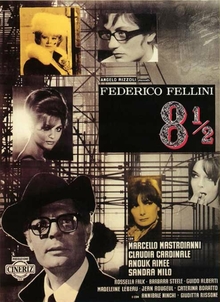
8½ is a 1963 comedy drama film co-written and directed by Federico Fellini. The metafictional narrative centers on Guido Anselmi, a famous Italian film director who suffers from stifled creativity as he attempts to direct an epic science fiction film. Claudia Cardinale, Anouk Aimée, Sandra Milo, Rossella Falk, Barbara Steele, and Eddra Gale portray the various women in Guido's life. The film was shot in black and white by cinematographer Gianni Di Venanzo and features a score by Nino Rota, with costume and set designs by Piero Gherardi.
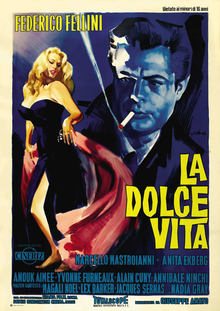
La dolce vita is a 1960 satirical comedy-drama film directed by Federico Fellini. It was written by Fellini, Ennio Flaiano, Tullio Pinelli, and Brunello Rondi. The film stars Marcello Mastroianni as Marcello Rubini, a tabloid journalist who, over seven days and nights, journeys through the "sweet life" of Rome in a fruitless search for love and happiness. The screenplay can be divided into a prologue, seven major episodes interrupted by an intermezzo, and an epilogue, according to the most common interpretation.

Nights of Cabiria is a 1957 drama film co-written and directed by Federico Fellini. It stars Giulietta Masina as Cabiria, a prostitute living in Rome. The cast also features François Périer and Amedeo Nazzari. The film is based on a story by Fellini, who expanded it into a screenplay along with his co-writers Ennio Flaiano, Tullio Pinelli and Pier Paolo Pasolini.

Giulia Anna "Giulietta" Masina was an Italian film actress best known for her performances as Gelsomina in La Strada (1954) and Cabiria in Nights of Cabiria (1957), for which she won the Cannes Film Festival Award for Best Actress at the 1957 Cannes Film Festival.

La strada is a 1954 Italian drama film directed by Federico Fellini and co-written by Fellini, Tullio Pinelli and Ennio Flaiano. The film tells the story of Gelsomina, a simple-minded young woman bought from her mother by Zampanò, a brutish strongman who takes her with him on the road.

I vitelloni is a 1953 Italian comedy drama film directed by Federico Fellini from a screenplay written by himself, Ennio Flaiano and Tullio Pinelli. It stars Franco Interlenghi, Alberto Sordi, Franco Fabrizi, Leopoldo Trieste, and Riccardo Fellini as five young Italian men at crucial turning points in their small town lives. Recognized as a pivotal work in the director's artistic evolution, the film has distinct autobiographical elements that mirror important societal changes in 1950s Italy.
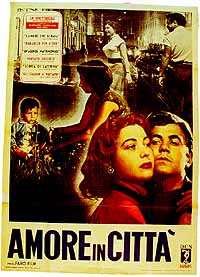
Love in the City is a 1953 Italian anthology film composed of six segments, each with its own director. The segments and filmmakers are: Paid Love, Attempted Suicide, Paradise for Three Hours, Marriage Agency, Story of Caterina, and Italians Stare.
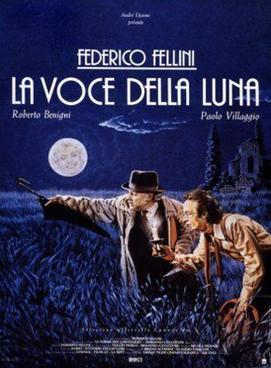
The Voice of the Moon is a 1990 Italian dramatic comedy film directed and written by Federico Fellini and starring Roberto Benigni, Paolo Villaggio, and Nadia Ottaviani. Based on the novel Il poema dei lunatici by Ermano Cavazzoni, and revisiting themes Fellini first explored in La strada (1954), the film is about a fake inspector of wells and a former prefect who wander through the Emilia-Romagna countryside of Fellini's childhood and discover a dystopia of television commercials, fascism, beauty pageants, rock music, Catholicism, and pagan ritual.

Fellini Satyricon, or simply Satyricon, is a 1969 Italian film written and directed by Federico Fellini and loosely based on Petronius's work Satyricon, written during the reign of Emperor Nero and set in Imperial Rome. The film is divided into nine episodes, following Encolpius and his friend Ascyltus as they try to win the heart of a young boy named Gitón within a surreal and dreamlike Roman landscape.
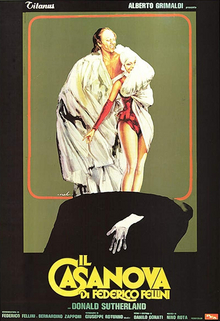
Fellini's Casanova is a 1976 Italian film directed by Federico Fellini from a screenplay he co-wrote with Bernardino Zapponi, adapted from the autobiography of 18th-century Venetian adventurer and writer Giacomo Casanova, played by Donald Sutherland. The film depicts Casanova's life as a journey into sexual abandonment, and his relationship with the "love of his life" Henriette. The narrative presents Casanova's adventures in a detached, methodical fashion, as the respect for which he yearns is constantly undermined by his more basic urges.
Gianni Di Venanzo, was an Italian cinematographer.
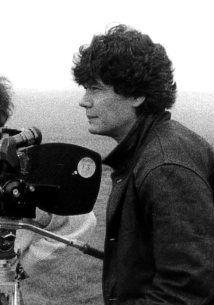
DamianPettigrew (1963) is a Canadian filmmaker, screenwriter, producer, author, and multimedia artist, best known for his cinematic portraits of Balthus, Carolyn Carlson, Federico Fellini, and Jean Giraud.

Tullio Kezich was an Italian screenwriter and playwright, best known as the film critic for Corriere della Sera and for his biography of Italian director Federico Fellini, Federico Fellini: His Life and Work.
Piero Gherardi was an Italian costume designer, production designer and art director. He is best known to international audiences for his collaborations with directors Mario Monicelli and Federico Fellini. Gherardi has been nominated three times for both the Academy Award for Best Costume Design and the Academy Award for Best Production Design for his work on Fellini's films, and he won twice for creating the costumes for La dolce vita (1960) and 8½ (1963).

Tullio Pinelli was an Italian screenwriter known for his work on the Federico Fellini films I Vitelloni, La Strada, La Dolce Vita and 8½.

Fellini: I'm a Born Liar is a 2002 French documentary film written and directed by Damian Pettigrew. Based on Federico Fellini's last confessions filmed by Pettigrew in Rome in 1991 and 1992, the film eschews straightforward biography to highlight the Italian director's unorthodox working methods, conscience, and philosophy.
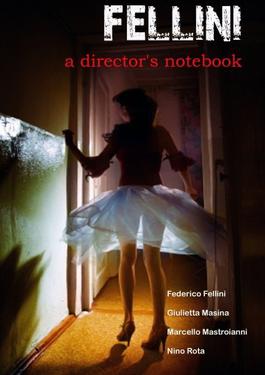
Fellini: A Director's Notebook is an Italian documentary for television directed by Federico Fellini shot in 16mm and first broadcast in the United States on NBC in 1969, on NBC Experiment in Television.
Federico Fellini (1920–1993) was an Italian film director and screenwriter.















